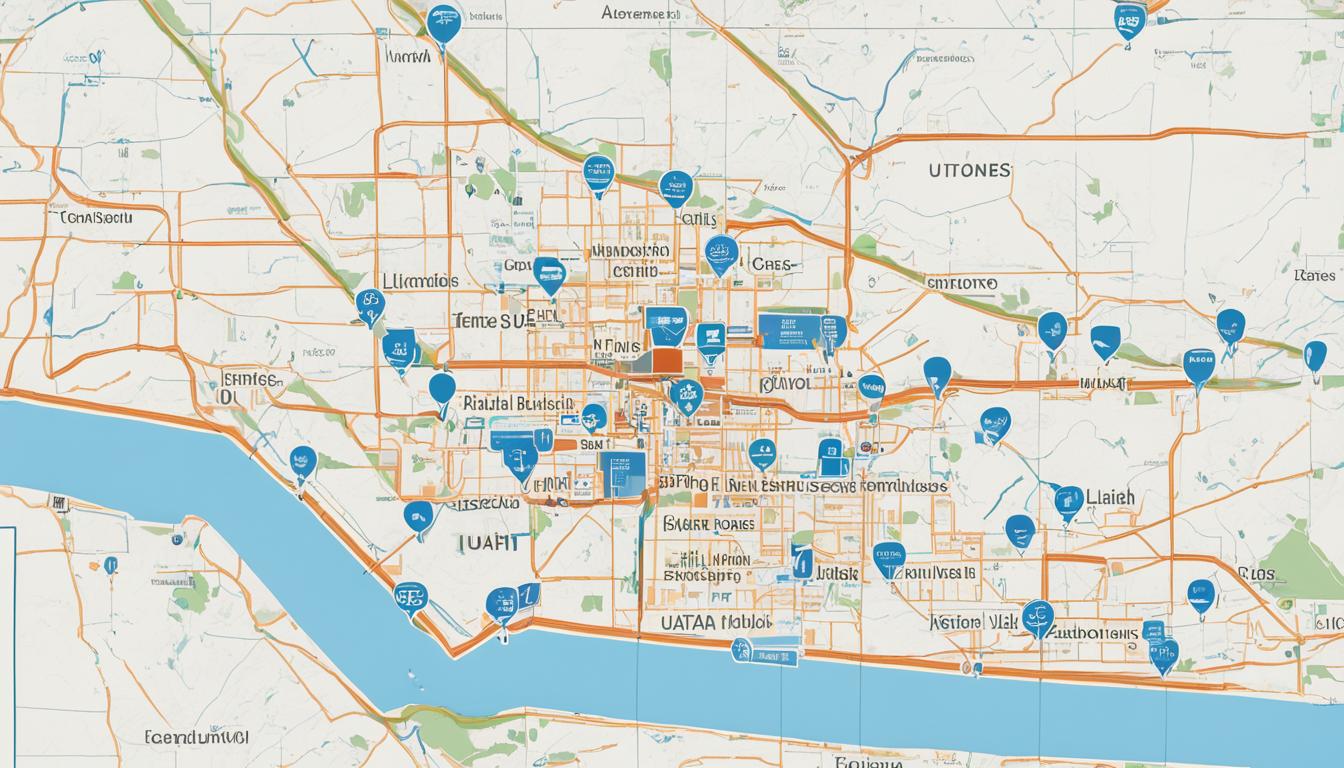If you’re setting out to launch a limited liability company (LLC) in Utah, understanding and budgeting for the necessary expenses is crucial, not least of which includes the Utah business license cost. Licensing your business is a vital step, ensuring that you stay compliant with local regulations and are authorized to operate legally. Whether you’re a budding entrepreneur or expanding your existing operation, clarity about how much is a business license in Utah is essential for planning and financial forecasting.
Unlike some states, Utah doesn’t have a one-size-fits-all business license cost; rather, it hinges on several factors including your location and industry. Expect some variance in fees based on the specific municipality in which your business will operate. However, understanding the Utah small business license cost now can save you time and protect you from unforeseen expenses as you proceed with setting up your LLC.
Key Takeaways
- Business license costs in Utah can vary widely, so it’s essential to check with your specific municipality.
- Utah doesn’t require a general state business license, but municipal and industry-specific licenses may be necessary.
- Anticipating the financial requirements for a business license helps with accurate budgeting for your Utah LLC.
- Stay informed about the different types of licenses needed to ensure your business complies with all regulations.
- Seeking professional advice or consulting local authorities can facilitate a smoother licensing process.
Understanding Utah Business Licensing Requirements
Embarking on the journey of obtaining a business license in Utah can be a straightforward process when you’re well-informed about the necessary steps. As an entrepreneur, you should be aware that your business license is a key document that legitimizes your operations and ensures compliance with local regulations. While it may seem daunting at first, understanding the specific requirements will help you navigate through the process with confidence.
The Role of a Business License for Your Utah LLC
A business license serves as official recognition from the state that your LLC is authorized to conduct business in Utah. It is a crucial component that signifies your adherence to the state’s standards and regulations. Beyond legality, it also enhances your company’s credibility among customers and potential business partners. Without it, your company’s operations may face legal challenges that could impede your business growth.
Navigating Industry-Specific and Location-Based Licenses
Depending on your industry and the nature of your LLC, you may need to acquire various industry-specific licenses. This could include health-related permits, construction licenses, or special zoning permissions. Additionally, your business location plays a pivotal role as Utah municipalities may have unique requirements for legally operating within their jurisdictions.
- Research the specific licenses required for your industry
- Consult with local municipalities to determine any additional permits
- Use professional services to simplify the application process
Knowing how to apply for a business license in Utah and obtaining the appropriate guidance can greatly reduce the complexity of starting your venture. Remember, the effort you put into covering all your licensing bases will pave the way for a secure and flourishing business in the Beehive State.
How Much Is a Business License in Utah: An Overview of Costs
Understanding the business license fees in Utah is a crucial step as you set up your venture. You may be wondering, “how much is a business license?” The truth is, it varies significantly based on where your business calls home within the state. Let’s break down what you can expect:
- In Salt Lake City, prepare to budget for a starting application fee around $100.
- Utah County businesses might face a flat rate of $150, with added costs per each member of your team.
Remember, the key to pinning down the precise Utah business license fees is to reach out to your local municipality. Each area has its own cost structure, designed to meet the unique needs of its community. So, connect directly with the local city or county office, and they will provide the most accurate and up-to-date information regarding your business license fees in Utah.
Steps for Obtaining a Business License in Utah
Embarking on the business license application process in Utah can seem daunting at first, but breaking it down into manageable steps can make the task more approachable. Your mission begins with identifying which licensing authority to engage with based on the nature and location of your business. Whether it’s a local municipality for a brick-and-mortar store or a federal agency for an enterprise with broader impact, understanding the appropriate authority is crucial for your business’s compliance and success.

Identifying the Right Agency: State vs. Local vs. Federal
Depending on your specific business activities and where your business is based, you might need to interact with various agencies to secure the proper licenses. Here’s how to identify which agencies you need to approach:
- **Local Agencies**: Typically, if your business operates within a city or town in Utah, you will engage with local government offices to obtain general business licenses that grant the authority to operate within that jurisdiction.
- **State Agencies**: For certain types of businesses that are regulated at the state level—such as those in healthcare, real estate, or finance—you’ll need to apply for specific licenses or permits through the Utah Department of Commerce or equivalent state regulatory bodies.
- **Federal Agencies**: Federally regulated activities, such as agriculture, alcohol, and aviation, require you to apply through the relevant federal agencies. This usually pertains to businesses with a wider geographical scope that’s beyond state boundaries.
The Application Process: Information and Documentation Requirements
Knowing how to apply for a business license in Utah requires understanding what information and documentation you need to compile. Here’s a summary of what’s generally expected during the application process:
- **Preparation of Business Details**: Assemble all necessary details, including your LLC name, Employer Identification Number (EIN), business address, and contact information.
- **Description of Business Activities**: Clearly delineate the nature of your business, the services or products offered, and the industry sector it falls under.
- **Gather Required Documentation**: Obtain and prepare any additional documentation that may be required, such as proof of address, ownership documentation, and in some cases, background checks or professional certifications.
- **Submission**: Submit your application, either online or in person, alongside the relevant fees, and await confirmation and issuance of your business license.
While each licensing agency may have specific nuances in their application processes, a careful review of their guidelines and adherence to their requirements will streamline your journey to acquiring the all-important business license in Utah.
The State Business License in Utah: Do You Need One?
If you’re setting up an LLC or expanding your entrepreneurship ventures in Utah, you might be puzzled about whether you need a state business license in Utah. While some entrepreneurs believe a universal license is the answer to compliance, this is not necessarily the case in the Beehive State. Instead, your attention might be more prudently directed towards industry-specific business licenses, which are vital for both legal operations and the credibility of your business. Understanding the difference and determining if you need a license at the state level is paramount.
General Business Licenses vs. Industry-Specific Licenses
In Utah, your business might not require a general state-wide business license, however, **industry-specific business licenses** are absolutely critical for certain types of ventures. For example, if you’re in healthcare, construction, or cosmetology, state-level licenses become non-negotiable to ensure safety, quality, and regulatory compliance. Remember, what may not be requisite on a state level could be essential in your specific field.
- Healthcare industries often need licenses related to medical services and facilities.
- Construction and contracting businesses require state-level permits to undertake any significant projects.
- Service industries, like barbershops and salons, need to prove their practitioners are qualified.
Resources for Determining State License Necessity
To ascertain whether your LLC falls into a category requiring a **state business license in Utah**, leverage the resources provided by the Utah Department of Commerce – Division of Occupational and Professional Licensing. Their comprehensive database includes search tools and license lists to guide you through the complexity of state regulations.
- Visit the Department’s website to utilize their licensing search tools.
- Consult the detailed list of professions and activities that require state-level licensing.
- When in doubt, contact the Department directly for clarification and guidance.
When it comes to compliance and veracity in your business practices, keeping abreast of the right licensing is not just a legal mandate but a strategic maneuver. So, double down on knowing your industry requirements and stay ahead of the regulatory curve.
Municipal Business Licenses: City and County Regulations
When embarking on your entrepreneurial journey in Utah, understanding the landscape of municipal business licenses is crucial. You’ll find that each locality within the state—from the majestic mountains of Salt Lake County to the red rock deserts of Washington County—has its unique set of city and county business regulations. These local regulations are in place to ensure that all businesses operate fairly and contribute to the community’s well-being.
Common Types of Municipal Business Licenses
Most often, the quest for acquiring the right documentation to legally operate your business will lead you to the realization that a general business license is a fundamental requirement across Utah’s municipalities. However, don’t be surprised to find that certain specs of your business may prompt the need for additional, industry-specific permits or licenses. For instance, food establishments may require health permits, while construction-related businesses might need to adhere to building codes and obtain construction permits.
- General Business License
- Home Occupation Permit
- Industry-Specific Permits
- Signage Permits
- Health and Safety Permits
Finding License Information for Your Utah Locality
Deciphering the specific business regulations governing your city or county in Utah may seem daunting. However, most municipalities have streamlined this process by providing resources online. A comprehensive visit to your respective city or county website can yield all the necessary details to get started. Should you encounter any uncertainties or require additional clarification, don’t hesitate to reach out directly to local authorities. They are there to assist you in navigating the requirements to ensure your business complies with all necessary regulations.
Remember, embracing the guidelines set by your local government will not only legalize your operations but also create a foundation for your business to thrive. Compliance brings credibility, and that’s your stepping stone towards building a trusted relationship with your community and clientele in Utah.
Utah’s Specialized Business License Fees
If you’re venturing into a business that falls into a regulated category in Utah, understanding the specific license fees is crucial. These Utah specialized business license fees cater to professions that require close monitoring and adherence to stringent state guidelines. Such regulations are in place to standardize operations and ensure that businesses engage responsibly in activities that have broader implications for public health and safety. Let’s dive into what you need to know about these specialized licenses and their associated costs.
- Alcohol-Related Businesses: For businesses involved in the sale, distribution, or manufacturing of alcoholic beverages, the Utah Department of Alcoholic Beverage Control is the go-to agency for licensing. Fees here vary depending on the type of license you require, which could range from a retail license for a local liquor store to a manufacturing license for a craft brewery.
- Controlled Industries: Other controlled industries may include those dealing with cannabis, gambling, or firearm sales. Each has its own set of Utah business license regulations and fees, set forth by the respective state agency responsible for oversight.
- Health and Safety: Services that have a direct impact on consumer health and safety, such as medical practices or food services, also face stringent licensing requirements with fees that reflect the cost of maintaining public welfare standards.
It’s important to note that these fees are subject to change and can be updated by the State of Utah without prior notice. Therefore, continuous engagement with state resources and regulatory updates is advisable for all business owners in specialized sectors. Even if your business is not currently in a high-regulation industry, staying informed about Utah business license regulations will help you anticipate and budget for potential future changes as your business grows or diversifies.

Finally, while the process may seem daunting, remember that these regulations are designed to protect both your business and your customers. By complying with the Utah business license regulations and paying the correct specialized business license fees, you’re contributing to a safe and fair market for everyone.
Running a Compliant Business: Utah Sales Tax License and Other Considerations
As you venture into the commercial landscape of Utah, the importance of complying with state regulations cannot be overstated. A critical step in maintaining lawful operations is securing Utah’s sales tax license, particularly if your business deals with tangible personal property or offers services subject to state tax. The Utah State Tax Commission is your go-to authority for acquiring this license, ensuring your business stays on the right side of tax laws.
Sales Tax License Essentials for Selling Goods and Services
Attaining a sales tax license in Utah is more than a formality; it’s a non-negotiable legal requirement for businesses that want to offer goods and services within the state. This essential document serves as a testament to your commitment to fairness and transparency in transactions. Without it, not only are you liable to face penalties, but your business’s integrity could also come into question, potentially impacting customer trust and your brand’s reputation.
Understanding Additional Permit Requirements
But your journey towards business compliance in Utah doesn’t end with a sales tax license. Depending on your niche, you might need additional permits reflecting your adherence to health and environmental regulations. Are you operating in a sector that impacts public health or the environment directly? Then be prepared to navigate through the requisites for specific health and environmental permits to reaffirm your business’s pledge to community well-being and sustainability.
- Local zoning permits ensure your business location is used in accordance with municipal planning laws.
- Health permits indicate your adherence to safe practices, particularly crucial for food-related businesses.
- Building permits testify to the structural integrity and compliance of your facilities with safety regulations.
Understanding and securing these permits is an investment in your business’s longevity and a nod to responsible entrepreneurship. Embark on this process with diligence and foresight, and keep your business flying high on the banners of compliance and integrity in the Utah market.
Navigating Federal Business License Requirements in Utah
As you embark on the entrepreneurial journey in Utah, understanding when your business activities intersect with federally regulated industries is paramount. Not all small businesses will need a federal business license in Utah, but for those engaged in sectors with federal oversight, securing the correct permits is a legal requirement and critical for your business’s longevity.
When Federal Licensing Applies to Your Business
If your Utah-based business operations include the production, sale, or distribution of alcoholic beverages, firearms, tobacco, or if you’re engaged in activities such as radio broadcasting or the handling of wildlife and animal products, you are stepping into the realm of federally regulated industries. Compliance with federal laws is not optional, and failure to obtain the necessary licensing can lead to severe penalties, including fines and business closure.
Agencies Involved in Federal Business Regulation
To meet federal business license requirements in Utah, it’s crucial to identify which federal agency governs your industry. For businesses involved in communications, such as television and radio, the Federal Communications Commission (FCC) is your go-to authority. Conversely, the Bureau of Alcohol, Tobacco, Firearms, and Explosives (ATF) oversees the licensing for the sale and manufacture of firearms and alcohol. It’s essential to reach out and apply for the necessary licenses through these specific agencies to ensure your business is operating legally at a federal level.
- FCC for broadcasting and communications licenses
- ATF for alcohol, tobacco, and firearms related permits
- Other agencies for various industries like agriculture, transportation, and energy
Conclusion
Embarking on the journey of starting a business in Utah places you in an environment ripe with opportunity, yet it demands a keen attention to detail in regulatory compliance. You’ve explored the varying degrees of licensing, from the municipal necessities to the potential requirements for state-level or federal permits. Whether your venture is in hospitality, retail, or any other sector, procuring the correct documentation is a crucial step in establishing your enterprise on solid ground.
As you navigate through the intricate web of Utah business start-up guidelines, remember that your due diligence in understanding local, state, and federal licensing requirements acts as the foundation for your business’s longevity and legal integrity. It’s imperative to engage with city or county offices, harness resources provided by the state, and stay abreast of federal regulations. This proactive approach not only helps to sidestep legal pitfalls but also positions your business for sustainable growth and success within Utah’s dynamic economy.
Your entrepreneurial aspirations in The Beehive State are supported by a comprehensive framework designed to facilitate business prosperity and regulatory adherence. By mastering the licensing logistics, your business can thrive, reflecting the pioneering spirit and robust character of Utah. So, gear up for an exciting venture in one of the most scenic and business-friendly landscapes in the country.
FAQ
How much is a business license in Utah?
The cost of a business license in Utah varies by the local municipality where your business is located, but can range from around 0 in Salt Lake City to a 0 base fee plus potential additional charges per employee in Utah County. Always check with your local municipality for the most accurate and current fee details.
What are the Utah business licensing requirements?
Requirements for a business license in Utah depend on the industry your business is in and your LLC’s location. There is no general business license at the state level, but local municipalities often require business licenses, and there could be industry-specific licenses or permits needed. It’s essential to consult with local city or county offices to understand all the specific requirements.
How do you apply for a business license in Utah?
To apply for a business license in Utah, you need to contact the appropriate agency—local, state, or federal—depending on your business activity and location. The application process typically involves providing your LLC name, EIN Number, owner’s address, and a description of your business activities. You might interact with the Utah Department of Commerce and local or federal agencies during this process.
Are there different fees for business licenses in Utah depending on the type of business?
Yes, business license fees in Utah can differ based on the type of business. High-regulation industries, such as those involving alcohol sales, may incur specific licensing costs and will need to apply through respective state agencies. General business licenses can have a fixed fee or a fee based on factors such as the number of employees.
What’s the difference between a general business license and industry-specific licenses in Utah?
A general business license authorizes your company to operate in a specific municipality and is commonly required by local cities or counties. Industry-specific licenses are necessary for businesses operating in regulated sectors, such as healthcare or construction, and are usually mandated at the state level to ensure compliance with industry standards.
Where can you find resources to determine if a state business license is necessary in Utah?
The Utah Department of Commerce – Division of Occupational and Professional Licensing provides resources like search tools and lists to help you figure out if your business needs a state-level license. It’s a good starting point for identifying industry-specific licenses required by your business.
How do you obtain a sales tax license in Utah?
If your business involves the sale of tangible personal property or taxable services in Utah, obtaining a sales tax license is essential and can be done through the Utah State Tax Commission. This license is a requirement for compliance with state tax laws.
Are there any federal licensing requirements for businesses in Utah?
Federal licensing may be required for businesses in Utah that are regulated at the federal level—such as those in exporting, importing, broadcasting, and selling products like alcohol or firearms. For these kinds of businesses, you must apply with the appropriate federal agency, including agencies like the Federal Communications Commission or the Bureau of Alcohol, Tobacco, Firearms, and Explosives.




